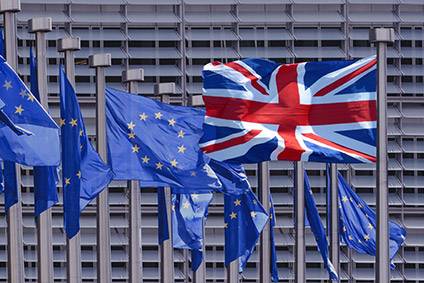
The UK government has outlined how rules surrounding so-called high-risk foods being imported into the country will change in the event of a no-deal Brexit.
The advice is part of a swathe of notices provided to different business sectors on action they would need to take before the UK’s EU exit next March to ensure that trade can be maintained in a no-deal scenario.

Discover B2B Marketing That Performs
Combine business intelligence and editorial excellence to reach engaged professionals across 36 leading media platforms.
For UK businesses that import food the government has provided advice on changes to the IT system for pre-notifying the import of high-risk food from outside the EU, changes to the import requirements for high-risk food transiting through the EU from a non-EU country to the UK and on a new requirement for the pre-notification of the import of high-risk food originating within the EU.
The current regime for importing high-risk food into the UK is regulated by EU legislation.
High-risk food is defined as all products of animal origin (POAO) and specified food of non-animal origin but while at the moment the EU determines what food is to be considered high-risk, in future, on any imports to the UK from the EU and third countries, this will be for the UK to decide.
The government said that f the UK leaves the EU in March with no deal in place, it is anticipated the UK would no longer have access to the EU import notification system TRACES.

US Tariffs are shifting - will you react or anticipate?
Don’t let policy changes catch you off guard. Stay proactive with real-time data and expert analysis.
By GlobalDataThis means importers to the UK from the rest of the world will no longer be able to use TRACES to notify the UK about those goods. To ensure those importing high-risk food could continue to do so, a new import notification system is being developed to take the place of TRACES. More information on the new system will be published in due course.
The UK would also lose access to the systems for exchanging intelligence about food incidents between EU countries and the reciprocal obligations between those countries and the European Commission. In order to respond to food safety incidents effectively, the UK’s Food Standards Agency (FSA) intends to require all importers of high risk food from the EU to pre-notify them using the new UK import notification system.
And if the UK leaves the EU in March 2019 with no deal in place the UK will no longer be able to rely on the EU undertaking full import controls on high-risk consignments transiting through the EU to the UK. The goods will therefore need to be checked as they enter the UK.
The UK government said that because the risk is not expected to change on day one, no new controls are envisaged in relation to imports of high-risk food from the EU for a time limited period after Brexit.
But anyone currently using the TRACES system to pre-notify the UK about high-risk food imports from the rest of the world will need to start using the UK’s new import notification system, ahead of March 2019.
The government said updates will be issued to the industry between now and March to assist users to prepare for this change and ensure their own businesses are ready for imports on the day the UK leaves the EU.
A no-deal Brexit will also mean changes to the ‘health mark’ carried on meat, dairy and fish products, the UK government advised today (12 October).





